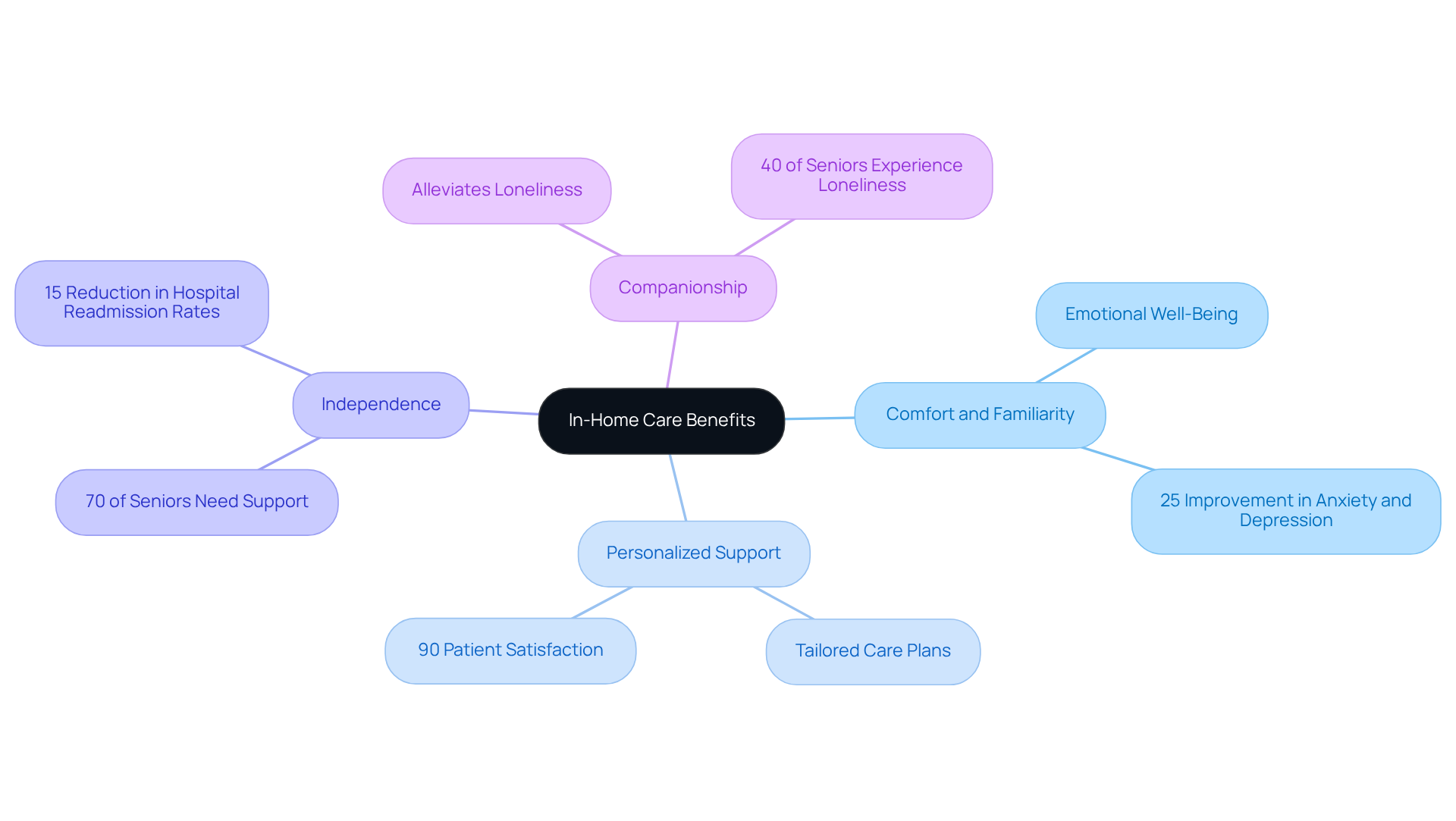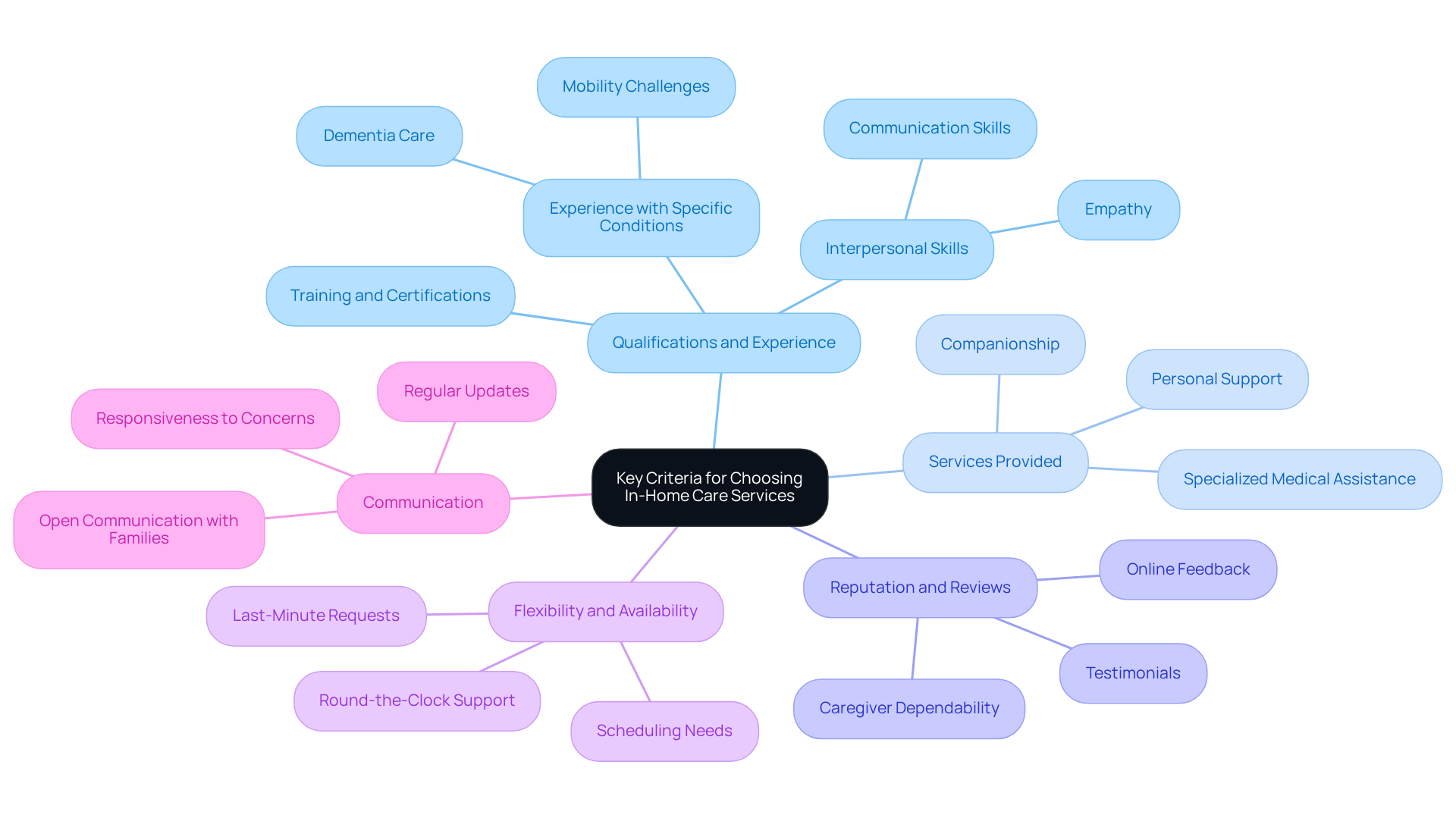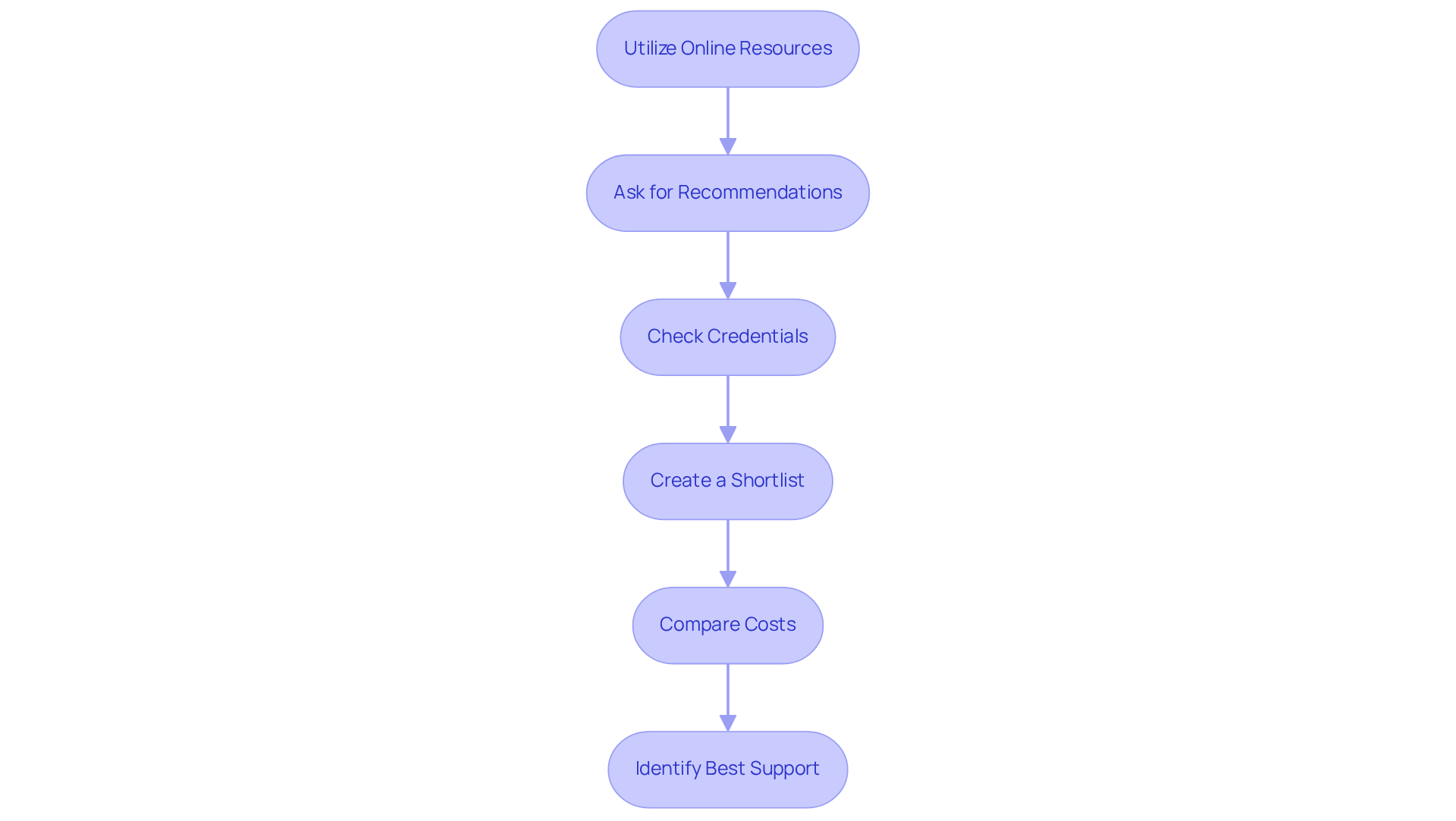Overview
Finding the best in-home care near you starts with recognizing the importance of personalized support. This support not only enhances emotional well-being but also promotes independence and provides companionship for individuals in their own homes. Many families face the emotional challenges of finding the right care, often feeling stressed and overwhelmed. Understanding these feelings is crucial.
The article outlines essential criteria for selecting quality care:
- Caregiver qualifications
- The services provided
- The significance of compatibility
By focusing on these aspects, families can make informed decisions that prioritize their loved ones’ needs and comfort. It’s important to remember that the right caregiver can make a world of difference, offering not just assistance but also emotional support.
As you explore your options, know that you are not alone in this journey. Many families have found comfort in the compassionate care available, sharing stories of how these services have positively impacted their lives. This reassurance can ease the stress of decision-making, allowing you to focus on what truly matters—your loved one’s happiness and well-being. With the right support, you can foster an environment where your loved ones feel valued and cared for in the comfort of their own homes.
Introduction
Navigating the world of in-home care can feel overwhelming for families. As they seek the best support for their loved ones, the emotional weight of this decision often weighs heavily. This essential service not only enriches the quality of life for individuals but also nurtures their independence and emotional well-being within the familiar surroundings of their homes. Yet, with so many options available, how can families be sure they are making the right choice?
By delving into key criteria and effective strategies for selecting the ideal in-home care provider, families can embark on this journey with confidence, ensuring that their loved ones receive the compassionate and personalized support they truly deserve.
Understand In-Home Care and Its Benefits
In-residence support encompasses a variety of helpful services aimed at delivering the best near me to assist individuals in the comfort of their own homes. This approach not only aids in daily tasks but also promotes autonomy and enhances .
- Comfort and Familiarity: Staying in their own homes allows clients to be surrounded by cherished belongings and memories, which significantly boosts their emotional well-being. Studies indicate that individuals receiving domestic support report a 25% improvement in anxiety and depression scores, closely tied to the comfort of their living environment.
- : Each service is tailored to meet the unique needs of every individual, ensuring that support plans align with their preferences and lifestyle. This customized approach addresses not only physical health needs but also the , resulting in greater overall satisfaction. In fact, over 90% of patients expressed satisfaction with their , highlighting the comfort and personalized nature of the services provided.
- Independence: In-home support empowers clients to maintain their autonomy. They receive assistance with daily tasks without having to relocate to a facility. Nearly 70% of individuals aged 65 and above will require some form of , making in-home options essential for preserving their independence. Additionally, patients receiving home support experience a 15% reduction in hospital readmission rates compared to those who do not receive such assistance, underscoring its effectiveness.
- Companionship: Caregivers provide not only physical support but also , which is vital in alleviating feelings of loneliness and isolation. Over 40% of seniors report feeling lonely regularly, highlighting the importance of social interaction for maintaining mental health. Engaging in meaningful social exchanges can enhance brain health and cognitive abilities, further emphasizing the significance of .
Overall, families seeking to improve the for their loved ones can find the best near me as a compassionate option. It ensures that individuals receive the while remaining in a familiar and comforting environment.
Identify Key Criteria for Choosing In-Home Care Services
Selecting the best near me can be a daunting task, and it’s important to approach this decision with compassion and understanding. Here are some key criteria to consider:
- : It’s crucial to ensure that caregivers have the necessary training and certifications in personal care and first aid. Experience with specific conditions, such as dementia or mobility challenges, plays a significant role in providing effective support. A positive connection between seniors and caregivers is vital; interpersonal skills and empathy are essential for successful in-home assistance.
- Services Provided: Different organizations offer varying levels of support. Reflect on whether you need companionship, , or to best meet your loved one’s needs.
- : Take the time to explore the organization’s reputation through online feedback, testimonials, and ratings from reliable sources. Pay special attention to comments regarding and the overall quality of assistance.
- : Consider whether the agency can accommodate your scheduling needs, including last-minute requests or the necessity for round-the-clock support.
- Communication: Choose a provider that values , providing regular updates and being responsive to any concerns.
Additionally, arranging is crucial. This ensures that the care provided adapts to your loved one’s evolving needs, maintaining alignment with their changing circumstances. With the anticipated projected to reach 17% from 2024 to 2034, driven by the increasing aging population, the demand for qualified caregivers is more critical than ever. Making informed decisions is essential for ensuring the best near me for your loved ones.
Research and Compare Local In-Home Care Providers
Researching and comparing the best near me providers can feel overwhelming, but you are not alone in this journey. Here are some steps to help you find the right support for your loved ones:
- Utilize Online Resources: Start by exploring platforms like Yelp, Care.com, and . These resources can help you find and assess local services. Pay close attention to ratings, reviews, and detailed service descriptions, as they can offer insight into the . It’s reassuring to note that in 2020, 98.6% of home health organizations in the U.S. were Medicare-certified, reflecting a high level of reliability among these providers.
- : Reach out to friends, family, or healthcare professionals for . Their firsthand experiences can provide valuable perspectives on the dependability and quality of services offered by specific organizations.
- Check Credentials: Ensure that the organizations you consider are by relevant state or national bodies. This verification confirms their adherence to industry standards for care and safety. Additionally, inquire about background checks for caregivers, as many trustworthy organizations conduct these to ensure safety and reliability.
- Create a Shortlist: Based on your research, compile a list of potential providers that meet your criteria. Include their contact information and key details about their services to make further inquiries easier.
- Compare Costs: Don’t hesitate to ask about pricing structures and payment options. Some agencies may accept insurance or offer sliding scale fees based on income, making it essential to understand the of your choices.
By conducting thorough research and making informed comparisons, families can identify the best near me for their loved ones, ensuring they receive the best possible support. Additionally, can offer extra assistance, helping families navigate the complexities of care options with compassion and understanding.
Conduct Interviews and Assess Caregiver Compatibility
Once you have narrowed down your options, it’s time to and assess with a compassionate approach:
- : Create a thoughtful list of inquiries to pose to potential providers. Focus on their experience, methods of support, and how they handle specific situations, such as emergencies or challenging behaviors.
- : Arrange face-to-face or virtual interviews with those providing care. Observe their communication style, demeanor, and willingness to engage—these elements are vital in establishing a connection.
- : If possible, include the person receiving care in the interview process. Their comfort and connection with the support provider are essential for a successful match, fostering a sense of trust and security.
- : Consider factors such as personality, interests, and . An individual who harmonizes with your loved one’s personality can significantly enhance their overall experience, making them feel understood and valued.
- : Ask for references from prior clients or employers. This step can provide and quality of care, offering peace of mind as you make your decision.
By carefully conducting interviews and assessing compatibility, families can ensure that they select a caregiver who not only meets their loved one’s needs but also , bringing comfort and reassurance in this important journey.
Conclusion
Finding the right in-home care for your loved ones is a deeply important decision that can significantly enhance their quality of life. In-home care provides a comforting blend of personalized support and companionship, enabling individuals to maintain their independence while receiving essential assistance. This approach not only fosters emotional well-being but also helps reduce hospital readmission rates, making it an invaluable choice for families in search of compassionate care.
When selecting in-home care services, it’s essential to consider:
- Caregiver qualifications
- Understanding the range of services offered
- Assessing the reputation of providers
By conducting thorough research and comparing local options, families can make informed choices that truly align with their loved ones’ needs. Engaging in the interview process also nurtures a sense of compatibility and trust between caregivers and clients, enriching the overall care experience.
The importance of in-home care is profound, especially as the demand for qualified caregivers continues to rise. Families are encouraged to prioritize the well-being of their loved ones by exploring the best in-home care services available. Taking the time to research, ask questions, and assess compatibility will lead to a more fulfilling and supportive environment, ultimately contributing to the happiness and health of those in need.
Frequently Asked Questions
What is in-home care?
In-home care encompasses a variety of services designed to assist individuals in the comfort of their own homes, helping with daily tasks while promoting autonomy and enhancing quality of life.
What are the emotional benefits of in-home care?
Staying in their own homes allows clients to be surrounded by cherished belongings, significantly boosting their emotional well-being. Studies show that individuals receiving domestic support report a 25% improvement in anxiety and depression scores.
How is in-home care personalized for individuals?
In-home care services are tailored to meet the unique needs and preferences of each individual, addressing both physical health needs and psychological aspects of recovery, resulting in greater overall satisfaction.
What is the satisfaction rate among patients receiving home health assistance?
Over 90% of patients expressed satisfaction with their home health assistance, highlighting the comfort and personalized nature of the services provided.
How does in-home care support independence for clients?
In-home support empowers clients to maintain their autonomy by assisting with daily tasks without requiring relocation to a facility, which is essential for preserving independence, especially for individuals aged 65 and above.
What impact does in-home care have on hospital readmission rates?
Patients receiving home support experience a 15% reduction in hospital readmission rates compared to those who do not receive such assistance, highlighting its effectiveness.
What role does companionship play in in-home care?
Caregivers provide emotional companionship in addition to physical support, which helps alleviate feelings of loneliness and isolation. Over 40% of seniors report feeling lonely regularly, making social interaction vital for maintaining mental health.
Why is in-home care considered a compassionate option for families?
In-home care allows families to improve the quality of life for their loved ones by ensuring they receive essential support while remaining in a familiar and comforting environment.





